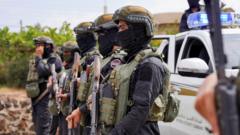In Suweida, southern Syria, a "cautious calm" has settled following a week marked by violent tribal clashes between Druze fighters, Bedouin gunmen, and government forces, according to reports from the UK-based Syrian Observatory for Human Rights (SOHR). The fighting ceased on Sunday after the Syrian government announced that Bedouin forces had retreated from the region. However, this calm emerged only after days of intense battles which left over 1,000 people dead and the city in a critical state regarding medical supplies.
The violence escalated following the abduction of a Druze merchant on a highway leading to the capital, Damascus, prompting sectarian tensions to boil over. SOHR noted that local Druze fighters maintained control of Suweida, while Bedouin gunmen withdrew from several areas in surrounding provinces. Following a ceasefire declaration by interim President Ahmed al-Sharaa, government security forces implemented measures to restrict access to the city, allowing only ambulances through as a way to stabilize the area.
Despite the declaration of peace, the conditions on the ground remained dire. Reports indicated a severe shortage of medical supplies, with testimonies from local citizens painting a grim picture of the humanitarian situation. A dentist from Suweida reported that hospitals were overwhelmed and in dire need of assistance, highlighting the distressing smell of corpses permeating local medical facilities.
While official reports confirm that fighting was no longer audible by Sunday morning, the effects of the violence continue to reverberate through the community, with calls for urgent aid becoming increasingly desperate. This recent wave of violence continues to expose the fragile balance of power between the various tribal factions and the Syrian government, reminding the global community of the ongoing turmoil in the region.
The violence escalated following the abduction of a Druze merchant on a highway leading to the capital, Damascus, prompting sectarian tensions to boil over. SOHR noted that local Druze fighters maintained control of Suweida, while Bedouin gunmen withdrew from several areas in surrounding provinces. Following a ceasefire declaration by interim President Ahmed al-Sharaa, government security forces implemented measures to restrict access to the city, allowing only ambulances through as a way to stabilize the area.
Despite the declaration of peace, the conditions on the ground remained dire. Reports indicated a severe shortage of medical supplies, with testimonies from local citizens painting a grim picture of the humanitarian situation. A dentist from Suweida reported that hospitals were overwhelmed and in dire need of assistance, highlighting the distressing smell of corpses permeating local medical facilities.
While official reports confirm that fighting was no longer audible by Sunday morning, the effects of the violence continue to reverberate through the community, with calls for urgent aid becoming increasingly desperate. This recent wave of violence continues to expose the fragile balance of power between the various tribal factions and the Syrian government, reminding the global community of the ongoing turmoil in the region.

















